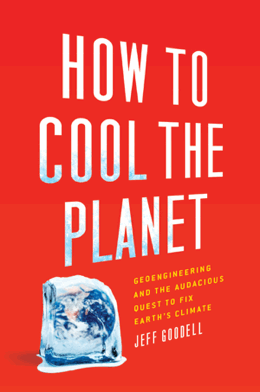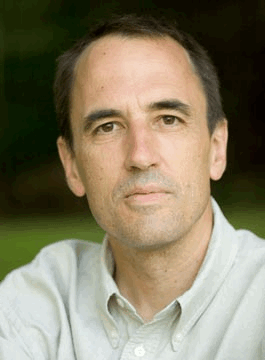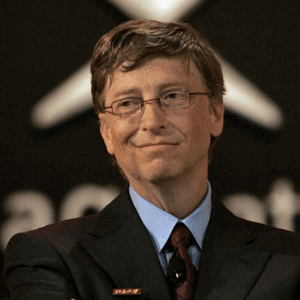Climate Change, Plan B
Air Date: Week of March 26, 2010

In the absence of political action to cut greenhouse gas emissions, some scientists are starting to seriously consider schemes to mitigate runaway global warming. But big plans to cool the earth, or geoengineering, pose big questions about how and whether we can responsibly manipulate the earth's natural systems. Host Jeff Young discusses the people and concerns driving the geoengineering debate from Jeff Goodell, author of the new book, How to Cool the Planet.
Transcript
YOUNG: Political inaction on climate change has some scientists thinking about a radical Plan B. It’s called geoengineering—altering the environment in order to manipulate the climate. It sounds like the stuff of science fiction, and the idea of making it reality raises a host of ethical issues. Geoengineering proponents recently gathered at the Asilomar conference center in California to talk about how and whether we should attempt to control the climate. Journalist and author Jeff Goodell was there. His forthcoming book about geoengineering is called “How to Cool the Planet.” Jeff Goodell, welcome to Living on Earth.
GOODELL: Thanks for having me.
YOUNG: So, what’s going with this conference and why is it taking place now do you think?
GOODELL: Well, when it comes down to it, it’s not the technical problems that are the real complexity here. It is the ethical, and political, and social, and cultural questions that are the most profound, and there hasn’t really been a forum yet to deal with that. And I think it’s happening now because we’re at a turning point in how we think about global warming.
And we’ve seen 30 years of talk about this and there’s been a lot of hope that we would sort of get enough information about this and understand the science well enough and we would then get our political act together and cut emissions and deal with this in the way that it obviously needs to be dealt with. But that isn’t happening and this conference is part of a larger sort of opening of rethinking the problem of how we’re going to deal with climate change.
YOUNG: And what are we talking about when we talking about geoengineering, exactly?
GOODELL: Well, I started out the book—and I’d heard about this idea of geoengineering a couple of years ago and I thought it was just a completely crazy idea. And there’s a number of, of course, crackpots in this who want to dump Special K cereal into the ocean in order to change the reflectivity of the ocean or set off nuclear bombs on the moon in order to put moon dust into space to reflect sunlight. But there’s a real, serious corps of scientists who are thinking about this. And the much more interesting part of this is methods of deflecting sunlight from the surface of the earth.

Basically, putting particles into the high stratosphere that would act like tiny mirrors and reflect away sunlight, or brightening clouds to reflect more sunlight off the top of clouds. And the really interesting thing is that, first of all, this is technically not that difficult to do, and you only have to deflect, say one to two percent of the sunlight away from the earth to offset, you know, a kind of doubling of CO2 emissions. But you have to have this continual injection of this stuff up there, and if you don’t the shade will go away and you will have a very rapid warming.
YOUNG: One of the things I really like about your book is you’re not just talking about the ideas here, but the people who are coming up with these ideas, and they’re fascinating. Who are these guys—and they are mostly guys—who want to control the climate? What’s driving them?
GOODELL: Well, two people to me sort of embody the kind of people who are behind this. And one is a man named Lowell Wood, who was a protégé of Edward Teller, who was godfather of the hydrogen bomb and an infamous figure in Cold War science.
He spent a lot of time building the Star Wars missile defense system, he was instrumental in that. And to him this is a kind of playing around with these big ideas that he loves to do—brilliant physicist and I don’t think he’s concerned about the environment, I don’t think he’s concerned even about global warming so much. I think he’s just a guy who likes to be influential.

Author Jeff Goodell.
And to me, he’s a kind of scarier side of this because he connects with this whole Cold War establishment. But another kind of person is someone like David Keith who’s a—runs an environment and energy program at the University of Calgary. And David is one of the sort of most serious-minded, most sort of moral human beings that I have ever met. And he’s a physicist and he’s spent a lot of time in the Arctic camping, and is deeply connected to the sort of environment and to the natural world.
And for him, geoengineering is an environmental tool. Basically, he argues that if we want to save an ecosystem like the Arctic, the only real chance to do that is going to be shielding some sunlight and cooling it off so that the ice doesn’t melt so quickly. Other than that, the way things are going, the Arctic is a goner. And so, he sees this as a risky, dangerous, but perhaps useful tool in that quest to kind of save the planet.
YOUNG: Another person who features prominently in your book is Bill Gates. What’s his interest in all this?
GOODELL: Bill Gates has funded some of David Keith’s research and some other scientist’s research into this. I think that Bill is interested in this for the same reasons that a lot of people are, in that he sees that we’re not doing anywhere near enough to confront this challenge, and so like many people he’s started to think of what else we might do. And it’s hard to deny that there’s kind of a techno strain going through this whole idea of geoengineering.
It’s very popular among people like Gates; it’s very popular in Silicon Valley, places like that. It’s a kind of even geeky idea because it sees the climate as a system that can be hacked and manipulated. And I think on some level that’s what Gates’ interest is; he sees the climate system as not so different than an operating system for a computer that ultimately we can figure out how to manipulate.
YOUNG: You also spend some time in your book pointing out the way things could go wrong with this, and your fears. What are your fears about geoengineering?
GOODELL: Oh, it’s a very long list. I mean we’re sort of messing with the gears and levers of the climate and we can’t make a perfect climate for everybody. You know, who gets the sort of better climate, who decides? I guess my biggest fear is that we could really—someone could start doing this and doing it badly.
If we get into a situation, or any nation gets into a situation, where climate change is causing extreme droughts or famine is driving by droughts that are linked to climate change, and there’s real calls to do something about this—a nation, whether it’s ours, or China, or India, or anyone else could just say they’re going to do this for political reasons: ‘Look we’re doing something, we’re trying to fix this.’
And you know, for example, in China they’re doing a lot of weather modification, cloud seeding and things like that trying to make it rain even though the science on that is very sketchy. For the 60th anniversary of the party last year they sent a bunch of planes up and tried to make the sky blue because they wanted blue sky for the day of the celebration. And so the political symbolism of this is sort of really dangerous, and it could be used simply as a political tool.

Bill Gates, one of the influential men interested in geoengineering.
YOUNG: This is such a hot topic, and one of the things I’ve encountered is just bring it up can be controversial because some people look at this whole topic of geoengineering and say, ‘Well, people are going to think this is a quick and easy fix and therefore you don’t have to worry about the real solutions to global warming.’ Is that still a factor here?
GOODELL: It’s a huge factor and I think that’s one of the things that everyone who thinks seriously about this is really afraid of because the only way that this sort of makes sense at all is—to keep in our back pocket as a sort of emergency response plan—to think that we can fix this complicated problem with this sort of simple fix by throwing little particles in the stratosphere is just very delusional and very, very kind of dangerous thinking. And there’s really the motivation for a lot of scientists who are thinking about that because they really want to show that, hey, this is possible, but you know what?
There’s a lot of other consequences to this. We might really change the weather patterns on the planet by doing this. I mean one of the fears that a lot scientists has is that the fossil fuel industry will get a hold of this essentially and begin in subtle ways arguing that this a way of buying time and why we don’t need to push so hard on cutting emissions right now. One of the things I like about the discussion about geoengineering is that it makes explicit this idea that we are in control.
Right now, we are in control. We are pushing the planet towards a completely different kind of climate, but we’re in denial about it. We want to pretend that we’re not responsible for what’s going to happen to the future of the planet, but in fact, we are responsible!
YOUNG: So we have folks gathering at these conferences to talk about the ethics of geoengineering, we have Congress looking into putting money into research, we have billionaires like Bill Gates looking to geoengineering—what would be a good outcome you think of all of that focus and interest?
GOODELL: Well, I think the best outcome of all this focus and interest would be to galvanize people to say, ‘Hey, if we don’t do something seriously about cutting emissions, if we don’t agree to some kind of global Copenhagen-like agreement, we are going to end up geoengineering the planet. And that’s a scary scenario because we might really screw it up.’
I think the second best outcome is that we take this idea seriously and make this a legitimate piece of the toolbox of how we might think about dealing with global warming. We might not ever need to do it, we might not ever want to do it, but I think that we need to know more about it so that we can decide as a culture whether to take this seriously or not and what the risks really are of going down this road.
YOUNG: Jeff Goodell’s new book is “How To Cool The Planet: Geoengineering and the Audacious Quest to Fix Earth’s Climate”. Thanks very much for talking with us.
GOODELL: Thanks for having me.
Links
Living on Earth wants to hear from you!
Living on Earth
62 Calef Highway, Suite 212
Lee, NH 03861
Telephone: 617-287-4121
E-mail: comments@loe.org
Newsletter [Click here]
Donate to Living on Earth!
Living on Earth is an independent media program and relies entirely on contributions from listeners and institutions supporting public service. Please donate now to preserve an independent environmental voice.
NewsletterLiving on Earth offers a weekly delivery of the show's rundown to your mailbox. Sign up for our newsletter today!
 Sailors For The Sea: Be the change you want to sea.
Sailors For The Sea: Be the change you want to sea.
 The Grantham Foundation for the Protection of the Environment: Committed to protecting and improving the health of the global environment.
The Grantham Foundation for the Protection of the Environment: Committed to protecting and improving the health of the global environment.
 Contribute to Living on Earth and receive, as our gift to you, an archival print of one of Mark Seth Lender's extraordinary wildlife photographs. Follow the link to see Mark's current collection of photographs.
Contribute to Living on Earth and receive, as our gift to you, an archival print of one of Mark Seth Lender's extraordinary wildlife photographs. Follow the link to see Mark's current collection of photographs.
 Buy a signed copy of Mark Seth Lender's book Smeagull the Seagull & support Living on Earth
Buy a signed copy of Mark Seth Lender's book Smeagull the Seagull & support Living on Earth

